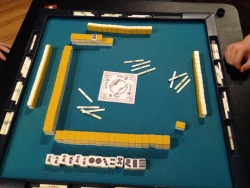Tenhou and chiihou
| Type | Yakuman |
|---|---|
| Kanji |
天和 地和 |
| English |
Heavenly hand Earthly hand |
| Value | Yakuman |
| Speed | Instant |
| Difficulty | Luck |
Tenhou 「天和」 is a yakuman, which is attained by the dealer completing the hand on the first tile draw. In this case, no tile has been discarded; and the hand is already declared a winner, before any other action had taken place. By far, this is the fastest instance by which a player can win a hand.
Chiihou 「地和」 follows the same premise as tenhou, where the dealt hand is already tenpai and the initial tile draw results in a win. The initial hand may use any pattern, as long as 13 tiles constitute a tenpai hand, and the 14th tile is the winning tile. Unlike tenhou, chiihou applies to the non-dealers.
Under normal circumstances for both yakuman, luck and recognition are the only factors contributing towards the hands' completion.
Formation
For both tenhou and chiihou hands, no action is required from the player, other than recognition of a complete hand with the 14 dealt tiles and the declaration of a winning hand. Failure to do so may result in a lost opportunity to score this rare yakuman.
Yet, unlike tenhou, chiihou may be interrupted by tile calls prior to the tile draw; and hence the opportunity to score this yakuman. If tile calls did occur prior to the draw, then the hand is limited to a mentsumo plus any other applied yaku and/or dora.
Double riichi furiten
One pitfall of tenhou and chiihou may be the accidental call for riichi due to the failure of recognition. This is likely due to the temptation of calling double riichi, before verifying the completeness of the hand. Therefore, it is necessary to check the hand before making such a dubious riichi call.
Value
Tenhou applies to dealer seats only, so therefore, it is always 48,000 points. Once again, chiihou applies to non-dealers valued at 32,000 points. Both must be won via tsumo. The ron variety would be called renhou, which has variable values and applications.
External links

- Tenhou in Japanese Wikipedia.
- Chiihou in Japanese Wikipedia.
| |||||||||||||||||||||||||||||||
